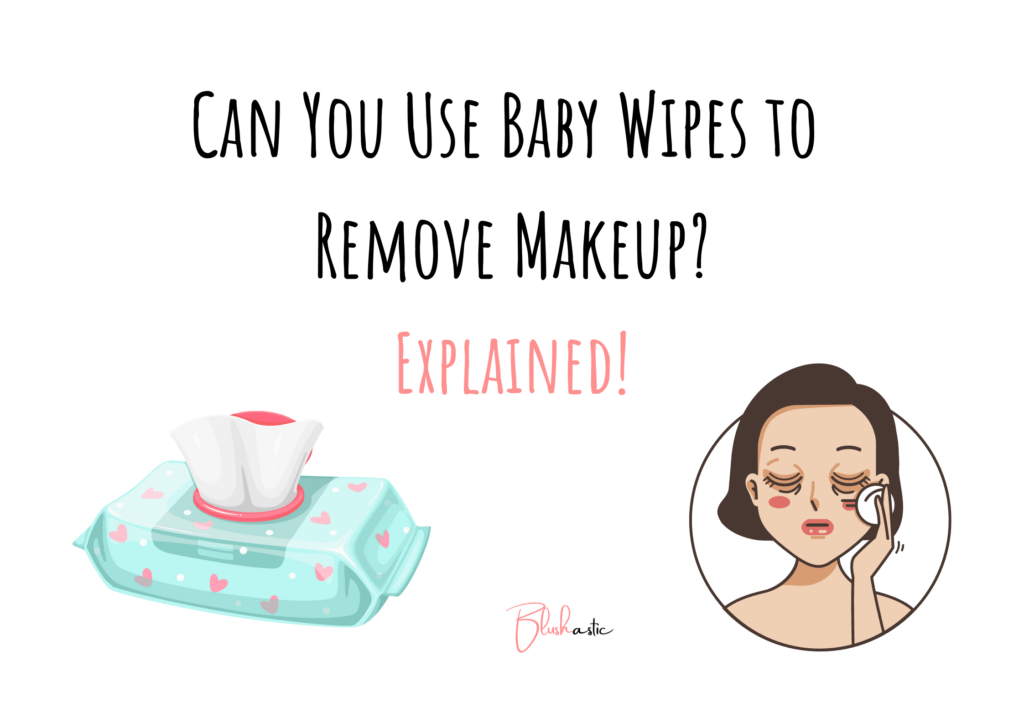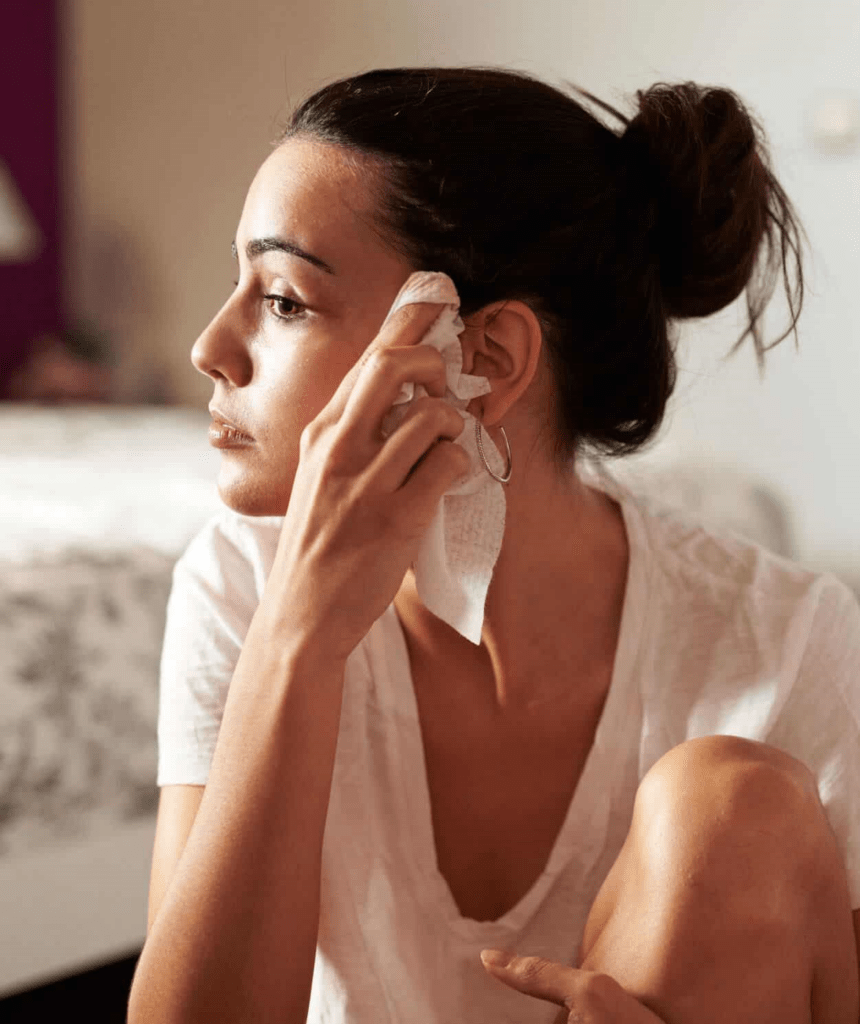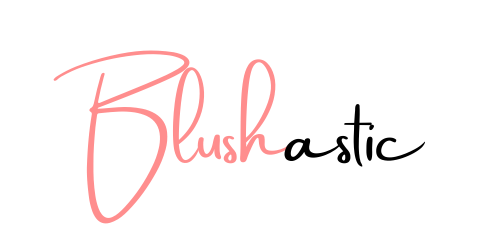The beauty industry thrives on experiments done by curious minds, whether it’s through careful planning or spontaneous ideas that just pop up. While we may not know exactly why someone thought of using baby wipes for removing makeup and is now excited about it, it’s understandable. The convenience and ease of using baby wipes to remove makeup can almost sell you on the idea, especially after a long day of work or a night of partying. Don’t you think?

So, if you’ve been hearing people replace their makeup removers with baby wipes and wonder if it’ll work, you’ve come to the right place. Can you use baby wipes to remove makeup? Is it safe? Will it get the job done? Don’t scratch your head trying to figure out the answers; relax and read this post to learn about this quirky yet inquisitive experiment.
Contents
Can You Use Baby Wipes to Remove Makeup? | Let’s Explore!
Makeup is fun, fulfilling, and therapeutic. Applying your favorite foundation in long strokes across your face, mixing different colors to create the perfect eye look, or applying lipstick – these simple details of the makeup process can be thrilling to many. However, as enjoyable as applying makeup is, the not-so-fun part is taking it off properly. It’s no surprise that the invention of makeup wipes brings joy to many people. But let’s face it. These wipes are laced with chemicals that you probably won’t be able to pronounce.

But baby wipes? Hold on! Aren’t they gentle? They’re certainly not loaded with harmful chemicals and function like makeup wipes. It’s reasonable to think that. Moreover, they are affordable, easy to find, and super simple to use. These are all good reasons to consider using baby wipes to clean dirt, grime, and makeup off your face. But how likely is it to work well? Let’s find out.
Can You Use Baby Wipes to Remove Makeup?
Baby wipes are moist disposable sheets commonly utilized for cleaning a baby’s skin during diaper changes. They are also convenient for wiping hands, face, and other areas prone to sweat and dirt accumulation. To assess their efficacy in cleaning and explore their potential for makeup removal, let’s take a brief look at the typical ingredients found in these wipes.
Baby wipes are primarily made up of water and mild surfactants. They might also include moisturizers, soothing ingredients, fragrances, and preservatives. It is important to note that these wipes contain no harsh cleaning or anti-bacterial agents to be gentle and safe for a baby’s sensitive skin. Hence, while they can help you clean your skin more conveniently by removing dirt and grime, they are not particularly potent enough to dissolve or remove makeup, particularly waterproof makeup.

However, if you find yourself in a situation where you only have baby wipes to remove your makeup, you may use them. They should be able to remove makeup from the skin’s surface. They will not, however, remove water-resistant or long-lasting makeup products such as mascara or lipstick. They also won’t reach deep into pores to clean out all the makeup. So, after using baby wipes, it’s recommended to use a proper makeup remover and cleanser when available.
Who Should Not Use Baby Wipes to Remove Makeup?
We’ve already established that baby wipes aren’t the best option for removing makeup, but they can be used if that’s all you have in certain situations. Despite this, there are some skin types and concerns for which you should never use a baby wipe. Let’s examine these skin types and why you should be cautious.
Sensitive Skin: Individuals with sensitive skin often understand the potential harm that using inappropriate products can inflict on their skin. Since sensitive skin is highly reactive, using baby wipes, which typically include essential oils as moisturizing agents and fragrances, can lead to skin irritation, resulting in burns, redness, and itching. This may also disrupt the skin barrier, exacerbating issues rather than providing relief.
Allergic Skin: Those with skin allergies or conditions such as eczema or psoriasis should strictly avoid using baby wipes to remove makeup. Surfactants, fragrances, and preservatives in baby wipes can easily irritate your skin. It is important to note that while baby wipes are gentle, they can still irritate sensitive and allergy-prone skin.
Oily Skin: Remember that baby wipes are intended to be moisturizing, so they contain ingredients that hydrate and nourish the skin. However, these ingredients may be incompatible with oily skin, making your face look excessively shiny and greasy. Using baby wipes to remove makeup may also cause your skin to appear dark and dull.
Acne-prone Skin: Baby wipes should not be used on acne-prone skin. It goes without saying that the ingredients in baby wipes will irritate and aggravate your acne. They can cause swelling, redness, rashes, and pain. Furthermore, as the baby wipes are rubbed on the skin, they may cause over-exfoliation or clog the pores. As a result, they can damage your skin barrier and worsen your acne.
Pros of Using Baby Wipes to Remove Makeup
- Affordable and readily available
- Convenient to use and dispose of
- Portable and easy to carry
- Gentle with no harsh chemicals or toxins
- Effective in removing dirt, grime, oil, and makeup from the skin’s surface
- Refreshing and allows the skin to breathe
- Handy in situations where proper makeup removal and face cleansing products are not accessible
Cons
- Not suitable for removing waterproof and long-lasting makeup formulations
- Excessive rubbing can lead to skin irritation, causing inflammation, redness, and itching
- May potentially clog pores, contributing to acne and breakouts
- Can be wasteful
Safer Alternatives to Remove Makeup
Makeup Wipes: We generally discourage using makeup wipes for various reasons, including their tendency to strip and damage the skin and their wasteful nature. However, if you have to choose between a baby wipe and a makeup wipe, it’s better to go for the latter. While makeup wipes have their drawbacks, they can still assist in efficiently removing makeup and impurities. Just select wipes that are gently formulated and free from harsh chemicals, fragrances, and preservatives.

Cleansing Balms and Oils: These are makeup removal products that are both effective and safe to use. Cleaning balms are waxy, whereas oils are liquid. They are incredibly effective at removing all of your makeup. They are also very effective at removing waterproof makeup.
If you’re wondering how to use these products on the go, you can buy travel-sized versions of your favorite products. However, if you cannot find mini versions of the same or do not wish to spend money on them, you can easily reuse small containers and bottles to carry a small amount of products with you.
Micellar Water: As the name implies, these products are water-light and highly effective at dissolving oil, grime, and makeup. Micellar water comprises purified water, moisturizing agents, and mild surfactants that effectively remove all types of makeup. To carry micellar water for on-the-go use, pour some into small spray bottles that easily fit in your bag.
Frequently Asked Questions | Can You Use Baby Wipes to Remove Makeup?
Can I use baby wipes on my face?
Because baby wipes are sometimes used to clean babies’ faces, it is safe to assume that adults can also use them. However, before you do so, you should take note of the ingredients in them and determine their compatibility with your skin type and concerns. While baby wipes can be a convenient way to refresh and clean your face on the go, if they cause any side effects, they can cause more trouble than necessary. Also, it is best to avoid them If you have sensitive, oily, allergy-prone, or acne-prone skin.
Can you use baby wipes to remove makeup for oily skin?
Baby wipes may help remove some makeup, but they may leave a lot of residue behind, especially if the makeup is water-resistant and long-lasting. As a result, your pores may become clogged, resulting in acne breakouts. Hence, avoiding using baby wipes to remove makeup is best if you have oily skin.

Can you use Cottonelle wipes to remove makeup?
Cottonelle wipes are a type of wet wipe primarily used for personal hygiene. They boast of being free of alcohol and other harsh ingredients, making them gentle to use. Cottonelle wipes, like baby wipes, may help remove some makeup from the skin but are less effective than a dedicated makeup remover wipe. Furthermore, the surfactant and fragrance used in these wipes may irritate your sensitive facial skin.
Can you use baby wipes to remove eye makeup?
Since baby wipes are wet, they can assist in taking off eyeshadow powders from your eyelids and removing regular eyeliner and mascara. However, they won’t be effective if your eye makeup products are waterproof, smudge-proof, non-transferable, and long-wearing.
Can you use baby wipes to remove mascara?
Regular makeup users are well aware that removing mascara is a difficult task. Even though dedicated makeup-dissolving products such as micellar water and cleansing balms and oils can make mascara removal simple, depending on the strength of the mascara formulation, it may take a few more tries than usual. Hence, using baby wipes to remove mascara may not be the best option because they lack the necessary ingredients. And if your mascara is water-resistant, removing it may be more difficult.
Final Thoughts
Can you use baby wipes to remove makeup? – A question that is understandable to pop up in your head. While there’s a chance they might work, it’s crucial to know they’re not designed for that purpose. Using baby wipes for makeup removal can lead to irritation and skin issues.
Sticking to dedicated and safe makeup removers like micellar water, balms, or oils is better. Only use baby wipes for makeup removal if they’re your only option. If you have to choose, using makeup wipes is better than baby wipes to reduce the risk of irritation and side effects.
I’m Sarah Abraham, the founder and co-author of Blushastic.com and a professional makeup artist. Beauty is more than just skin deep, and that’s why I’m passionate about sharing my knowledge and experience to help people feel confident and beautiful on the inside and out.
Whether it’s skincare, haircare, or fashion, my goal is to empower women to feel their best. With my expertise in the beauty industry, I strive to provide practical advice and tips that are accessible to everyone, regardless of their skill level or budget.
